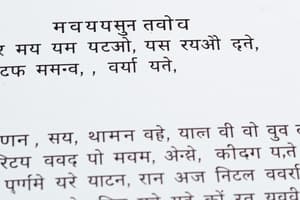Podcast
Questions and Answers
What is the primary script used for writing the Assamese language?
What is the primary script used for writing the Assamese language?
- Assamese script (correct)
- Bengali script
- Devanagari script
- Latin script
Which of the following is not a major dialect of Assamese?
Which of the following is not a major dialect of Assamese?
- Goalpariya
- Kamrupi
- Bengali (correct)
- Barpetia
Which grammatical structure is mostly used in the Assamese language?
Which grammatical structure is mostly used in the Assamese language?
- Subject-Verb-Object order
- Subject-Object-Verb order (correct)
- Object-Verb-Subject order
- Verb-Subject-Object order
What significant cultural movement took place in the 19th century influencing Assamese literature?
What significant cultural movement took place in the 19th century influencing Assamese literature?
What is one of the major challenges currently faced by the Assamese language?
What is one of the major challenges currently faced by the Assamese language?
Flashcards are hidden until you start studying
Study Notes
Overview of Assamese
- Language Family: Indo-Aryan, part of the larger Indo-European language family.
- Region: Primarily spoken in the state of Assam, India.
- Speakers: Approximately 15 million speakers.
Script and Writing System
- Script: Assamese script, an abugida derived from Brahmi script.
- Characters: Similar to Bengali script, with distinct modifications for Assamese phonetics.
Dialects
- Major Dialects:
- Kamrupi: Spoken in the western part of Assam.
- Goalpariya: Predominantly in the Goalpara district.
- Barpetia: In the Barpeta and Rangia regions.
- Standard Assamese: Based on dialect of lower Assam, considered prestigious.
Phonetics and Grammar
- Phonetic Features:
- Vowel harmony.
- Unique nasalized vowels.
- Grammar:
- Subject-Object-Verb (SOV) order.
- Use of postpositions instead of prepositions.
- Rich system of noun inflections and verb conjugations.
Literature and Culture
- Literary History:
- Ancient texts date back to 14th century.
- The "Assamese Renaissance" in the 19th century led to modern literature.
- Notable Authors:
- Jyoti Prasad Agarwala, Birendra Kumar Bhattacharya, and others.
- Folklore and Traditions:
- Rich oral traditions, including Bihu songs and tales.
Current Status
- Official Status: Recognized as an official language of Assam.
- Education and Media:
- Taught in schools and used in government and media.
- Growing presence in digital platforms and literature.
Preservation and Challenges
- Cultural Significance: Essential for Assamese identity and heritage.
- Challenges: Urbanization and migration leading to language shift; efforts made to revitalize and promote usage in various domains.
Overview of Assamese
- Indo-Aryan language with approximately 15 million speakers.
- Primarily spoken in Assam, India.
Script and Writing System
- Uses the Assamese script, derived from Brahmi script.
- Similar to Bengali script, but with adjustments for Assamese phonetics.
Dialects
- Major dialects include Kamrupi, Goalpariya, Barpetia, and Standard Assamese.
- Standard Assamese, based on the Lower Assam dialect, is considered prestigious.
Phonetics and Grammar
- Phonetic features include vowel harmony and unique nasalized vowels.
- Grammar follows a Subject-Object-Verb (SOV) word order.
- Uses postpositions instead of prepositions.
- Possesses a complex system of noun inflections and verb conjugations.
Literature and Culture
- Literary history dates back to the 14th century.
- The "Assamese Renaissance" in the 19th century paved the way for modern literature.
- Notable authors include Jyoti Prasad Agarwala and Birendra Kumar Bhattacharya.
- Rich in oral traditions, including Bihu songs and folktales.
Current Status
- Recognized as an official language of Assam.
- Used in education, government, and media.
- Growing presence in digital platforms and literature.
Preservation and Challenges
- Holds cultural significance as a key aspect of Assamese identity and heritage.
- Faces challenges from urbanization and migration, leading to language shift.
- Efforts are underway to revitalize and promote Assamese usage in various domains.
Studying That Suits You
Use AI to generate personalized quizzes and flashcards to suit your learning preferences.




